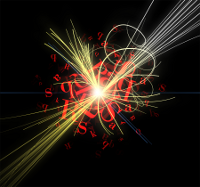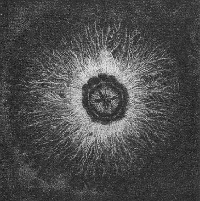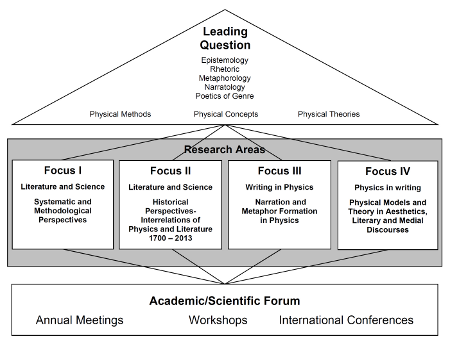Contact Address:
Prof. Dr. Klaus Mecke
Institut für Theoretische Physik
Universität Erlangen-Nürnberg
Staudtstraße 7
91058 Erlangen
Germany
Phone: +49-9131-85 28441
Fax: +49-9131-85 28444
Contact Address:
Dr. Aura Heydenreich
Germanistik und Komparatistik
Universität Erlangen-Nürnberg
Bismarckstraße 1b
91054 Erlangen
Germany
Phone: +49-9131-85 22978
| Our partners at FAU: | |
 |
 |
 |
 |
 |
 |
| Our partners worldwide: |
- Society for Literature, Science and the Arts, USA
- Society for Literature, Science and the Arts, Europe
- British Society for Literature and Science, Oxford
- Beckman Institute for Advanced Science and Technology, Illinois
- Institute of Advanced Study in the Humanities and the Social Sciences, Universität Bern
- Ometeca, Institute for Humanities and Science, USA
- Commission on Science and Literature DHST/IUHPST, Athens
- Carl von Linde-Akademie (TUM)
Scientific Vision
Physics, literature and literary criticism are discourses of knowledge production which have drifted apart considerably in the course of the modern functional differentiation of social systems. At the same time, both discourses contribute to the comprehension and mastery of present and future problems which invariably have both technological and cultural implications. Technologies and worldviews, shaped by physical knowledge, often acquire the status of central myths and determine human life worlds. They are therefore of tremendous cultural relevance.  The evaluation and assessment of their goals, limitations and effects as well as of their inherent chances and risks is an ongoing process and cannot be negotiated within the necessarily narrow limits of physical discourse alone. With the aesthetic representation of key signatures of its time, literature forms an interdiscourse, reintegrating functionally differentiated systems of knowledge into the horizon of the life world. At present more well informed and highly reflective literary texts dealing with physical issues are being published than ever before. By means of dialogue and narration, they translate physical knowledge from mathematical-symbolic into verbal-polyvalent forms of representation and re-embed it in specific cultural contexts. Recent literary criticism and linguistic studies have therefore begun to investigate discursive and narrative modulations of physical theories both in literary texts and in scientific literature. Physics is itself becoming increasingly aware, both of the linguistic dimension of scientific communication and research and of the general cultural dimension of physical knowledge: The field has begun to reflect on both, the epistemological importance of metaphor (“field”, “spacetime”, “supersymmetry”) and on the communicative and cultural conditions determining the goals, priorities and ethical limits of scientific research.
The evaluation and assessment of their goals, limitations and effects as well as of their inherent chances and risks is an ongoing process and cannot be negotiated within the necessarily narrow limits of physical discourse alone. With the aesthetic representation of key signatures of its time, literature forms an interdiscourse, reintegrating functionally differentiated systems of knowledge into the horizon of the life world. At present more well informed and highly reflective literary texts dealing with physical issues are being published than ever before. By means of dialogue and narration, they translate physical knowledge from mathematical-symbolic into verbal-polyvalent forms of representation and re-embed it in specific cultural contexts. Recent literary criticism and linguistic studies have therefore begun to investigate discursive and narrative modulations of physical theories both in literary texts and in scientific literature. Physics is itself becoming increasingly aware, both of the linguistic dimension of scientific communication and research and of the general cultural dimension of physical knowledge: The field has begun to reflect on both, the epistemological importance of metaphor (“field”, “spacetime”, “supersymmetry”) and on the communicative and cultural conditions determining the goals, priorities and ethical limits of scientific research.  Also, physical concepts have entered the field of literary theory (“literary field”, “spacetime”/“chronotope”, “places of indeterminacy”). These points of intersection between physical and cultural practices constitute a research field recognised for its considerable importance and interdisciplinary potential. Little research has so far been conducted in this area, since unconventional avenues of communication between highly specialised expert discourses are necessary to advance research in this field. For scientific fields aware of their social responsibility and therefore interested in a cooperative take on cultural innovations and risks, however, a successful dialogue is essential. The analysis of concept formation in the natural sciences can profit from the competence of literary theory, while the analysis of the transformation of physical knowledge in literary texts needs to be complemented by a sound knowledge of physical theory. ELINAS provides a platform for this exchange: it develops this research field historically and systematically by building on two traditionally strong research areas of University Erlangen-Nuremberg, bringing together the competences in the fields of literary and cultural studies as well as the natural sciences represented by the departments to which the members belong. The main challenge of ELINAS lies in developing a common systematic approach on the basis of the two highly differentiated, methodologically reflected expert discourses. This synergetic approach will enable analysing both discourses' textual constitution and conceptualising their mutual transformations on a historical and synchronic basis.
Also, physical concepts have entered the field of literary theory (“literary field”, “spacetime”/“chronotope”, “places of indeterminacy”). These points of intersection between physical and cultural practices constitute a research field recognised for its considerable importance and interdisciplinary potential. Little research has so far been conducted in this area, since unconventional avenues of communication between highly specialised expert discourses are necessary to advance research in this field. For scientific fields aware of their social responsibility and therefore interested in a cooperative take on cultural innovations and risks, however, a successful dialogue is essential. The analysis of concept formation in the natural sciences can profit from the competence of literary theory, while the analysis of the transformation of physical knowledge in literary texts needs to be complemented by a sound knowledge of physical theory. ELINAS provides a platform for this exchange: it develops this research field historically and systematically by building on two traditionally strong research areas of University Erlangen-Nuremberg, bringing together the competences in the fields of literary and cultural studies as well as the natural sciences represented by the departments to which the members belong. The main challenge of ELINAS lies in developing a common systematic approach on the basis of the two highly differentiated, methodologically reflected expert discourses. This synergetic approach will enable analysing both discourses' textual constitution and conceptualising their mutual transformations on a historical and synchronic basis.


